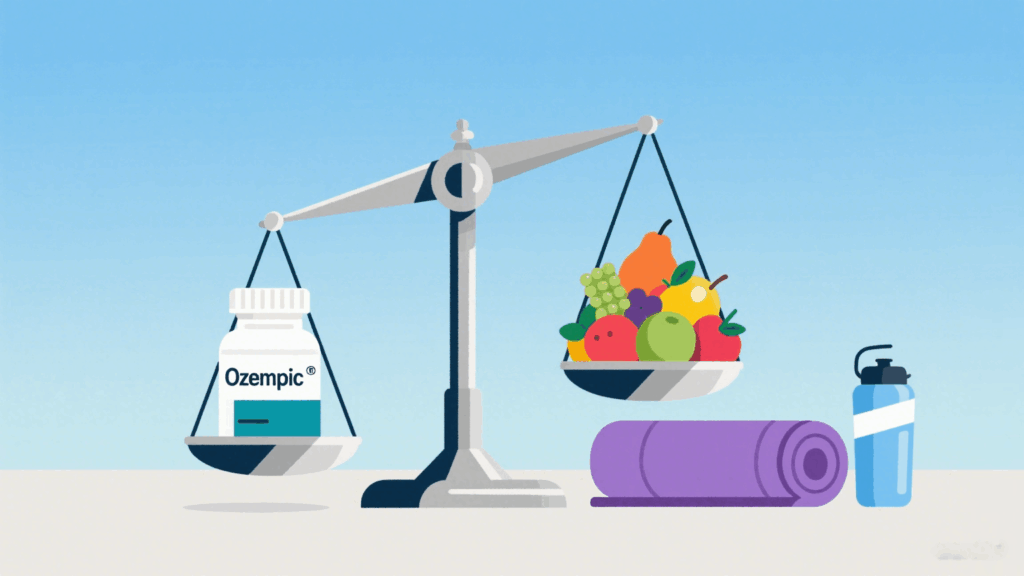
In recent years, conversations around weight management have shifted from traditional diet plans and exercise routines to pharmaceutical solutions. A once quiet medication has entered the mainstream with viral intensity. Social media feeds, celebrity interviews, and magazine headlines now frequently reference a single name in connection with rapid body transformations.
While quick fixes have always been part of the broader narrative around body image, health, and societal standards, today’s developments raise new questions. Are we witnessing a medical revolution or simply the repackaging of age-old beauty ideals through modern science?
What Is Ozempic?
Ozempic is a brand name for semaglutide, a medication originally approved to treat Type 2 diabetes. It belongs to a class of drugs known as GLP-1 receptor agonists, which help lower blood sugar levels by enhancing insulin secretion. What has sparked recent interest, however, is its secondary effect: significant weight loss in many patients.
This unintended benefit has led to Ozempic being prescribed off-label for weight loss, even in individuals without diabetes. Demand has surged, turning the medication into a cultural and commercial phenomenon. Celebrities, influencers, and everyday users alike now attribute their slimmer figures to the drug.
How Ozempic Is Reshaping Weight Loss Culture
The intersection of Ozempic & weight loss culture reveals a new phase in the age-old pursuit of thinness. While its medical use is valid and often necessary for people with metabolic disorders, its off-label popularity brings up ethical, societal, and health-related concerns.
1. Shifting Perceptions of Effort and Health
Traditionally, weight loss was linked to self-discipline, willpower, and consistency—whether through calorie counting, intense workouts, or structured diet plans. The rise of Ozempic alters this dynamic, offering a pharmaceutical shortcut that bypasses traditional routes.
This shift can be both liberating and problematic. On one hand, it may provide a lifeline for those who struggle with obesity and related conditions. On the other, it could reinforce the dangerous idea that thinness equals health, regardless of how it’s achieved.
2. Ethical Concerns and Inequity
There’s an ethical dilemma embedded in this trend. Many patients who genuinely need Ozempic for diabetes management are experiencing shortages due to increased off-label use. Meanwhile, wealthier individuals can access the medication for aesthetic purposes—leaving medically vulnerable populations at a disadvantage.
Moreover, insurance coverage for Ozempic often does not extend to its use for weight loss, creating a divide between who can use the drug and who should.
3. Social Media and Unrealistic Standards
The rise of Ozempic parallels a spike in “before-and-after” transformation content online. Many users post about their journey using the medication, often glamorizing rapid results without disclosing side effects, medical supervision, or context.
This selective sharing fuels unrealistic expectations and body image anxiety, particularly among younger demographics already susceptible to appearance-based pressures. The digital landscape now contributes to a version of weight loss culture that feels less about health and more about conformity to aesthetic ideals.
Medical Perspective: Is Ozempic Safe for Weight Loss?
While semaglutide has shown effectiveness for weight reduction, it’s not without risks. Reported side effects include:
- Nausea and vomiting
- Fatigue
- Constipation or diarrhea
- Potential thyroid tumors (in rare cases)
Clinical trials for the weight-loss version of the drug, branded as Wegovy, indicate that it must be combined with lifestyle changes for sustainable results. Additionally, once patients stop taking Ozempic, weight regain is common if dietary and activity habits are not maintained.
Broader Impact on Weight Loss Culture
The cultural implications of Ozempic go beyond individual users. They point to larger trends in how society approaches body image, medical innovation, and responsibility.
1. Medicalizing Aesthetic Goals
There’s a fine line between treating a chronic condition and medicalizing a desire for thinness. Ozempic blurs this boundary, encouraging people to pursue pharmaceutical solutions for what may be more social than health-related issues.
This reinforces a culture where appearance-driven solutions take precedence over holistic wellness.
2. Reinforcement of Weight Bias
The increasing use of Ozempic as a shortcut may unintentionally validate existing weight bias—the assumption that people in larger bodies are inherently unhealthy or undisciplined. This can deepen the stigma, making individuals feel pressured to turn to medical interventions, even if their health is not compromised.
3. Implications for Younger Generations
As younger individuals witness role models and influencers attribute their physiques to medications, it may foster the belief that body modifications should be easy, instant, and drug-induced. This could have long-term effects on mental health, self-esteem, and relationship with food and body.
Regulatory and Pharmaceutical Landscape
With the popularity of Ozempic growing, pharmaceutical companies are investing more in GLP-1 drug research. New iterations and competitors are already in development. However, regulation of off-label use remains murky, and oversight on marketing and social media influence is minimal.
Health professionals are calling for:
- Stricter prescribing guidelines
- Clear communication around side effects
- Better education on sustainable weight management
Is There a Better Way Forward?
Ozempic offers a solution for certain people, but its mainstream adoption raises an essential question: Should quick results overshadow comprehensive wellness?
A healthier narrative might focus on:
- Understanding root causes of weight gain
- Encouraging balanced, sustainable approaches
- Supporting mental and emotional well-being
Weight loss culture needs more than a new pill—it needs a new mindset. One that validates diverse body types, emphasizes function over form, and prioritizes informed decision-making over viral trends.
Final Thoughts
Ozempic & weight loss culture are now deeply intertwined, reflecting both our medical advancements and societal anxieties. While the drug has genuine benefits, the way it’s being used and promoted speaks volumes about where we place value as a culture.
True health goes beyond a number on the scale or the size of your jeans. As we embrace new technologies, we must also remain critical and conscious of their broader impact—not just on our bodies, but on our minds and communities.
